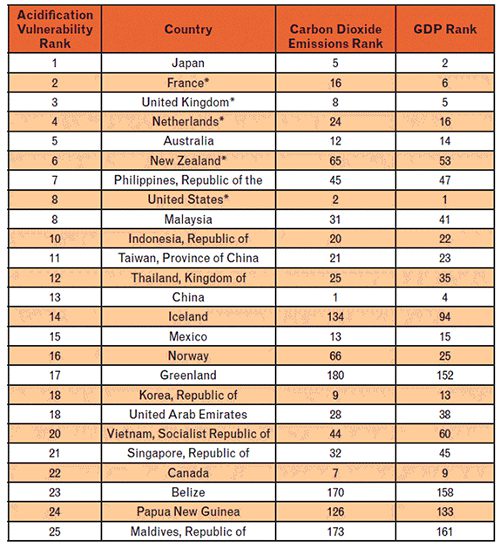Major CO2 –Emitting Nations Vulnerable to Ocean Acidification
Press Release Date: December 2, 2009
Location: Washington, D.C.
Contact:
Anna Baxter | email: abaxter@oceana.org
Anna Baxter
A new Oceana study of the vulnerability of individual nations to ocean acidification reveals that six of the ten biggest CO2 polluters are likely to suffer most from the impacts of ocean acidification by 2050.
Japan ranks first in the Oceana analysis of most vulnerable nations, followed by France, the United Kingdom, the Netherlands and Australia. China and the United States, the world’s top-ranked carbon dioxide emitters, ranked 13th and 8th, in relative vulnerability to ocean acidification.
Each nation’s vulnerability to acidification is based on many factors, including its dependence on coral reefs, the size of its fishery, and its fish and shellfish consumption patterns. Nations at high latitudes are especially vulnerable, as acidification will tend to occur sooner in their waters.
More than one-third of the world’s population lives in one of the 25 nations that will be most affected by ocean acidification. Moreover, among the most vulnerable are those with the highest GDP, including the United States, China, Japan, Canada, the United Kingdom and the Republic of Korea. These six nations alone were responsible for 51 percent of global CO2 emissions in 2007.
Ranking of 25 Countries Most Vulnerable to Ocean Acidification:

*Includes territories when considering coral reef area as a percent of a country’s Exclusive Economic Zone (EEZ)
Changing Chemistry Threatens Species Survival
Ocean acidification, which occurs when seawater absorbs CO2, lowers the pH of the ocean, making it harder for many marine animals to build their calcium carbonate shells and skeletons. At higher levels of acidity (lower pH), shell and skeletal growth will become increasingly difficult, damaging animals’ natural protection from predators and disease. Worsening acidity will also turn vibrant coral reefs into rubble. More acidic seawater can also disrupt the ability of marine animals to breathe, grow and reproduce.
If nations do not slow their emissions drastically, scientists project a massive extinction of corals worldwide by the end of this century. As reefs disappear, many commercially important fish species that depend upon reef services will also be in danger. The world’s fisheries are likely to be affected by acidification both directly, through biological and physiological changes, and indirectly, through habitat declines and food shortages. As acidification worsens, many countries will suffer economic and food insecurity, as well as a loss of coastal storm protection and tourism revenue.
Coral reefs provide services worth an estimated 30 billion $US annually to the global economy, according to private economic researchers (Source: Cesar, H. et al. 2003, The Economics of Worldwide Coral Reef Degradation).
“Choosing to slow ocean acidification and climate change will be less expensive than allowing these huge threats to continue unchecked,” said Jacqueline Savitz, Oceana’s senior campaign director. “These most vulnerable nations need to reduce carbon emissions to protect their increasingly fragile economies. As some of the world’s richest nations, their actions will have great impact on their own ocean-dependent economies, and of course, on the rest of the world.”
Preventing Major Extinctions
To prevent further damage to coral reefs, scientists suggest we need to stabilize atmospheric CO2 levels at 350 parts per million (ppm) or lower.
To achieve this goal, top climate scientists on the Intergovernmental Panel on Climate Change recommend a reduction of global emissions by at least 85 percent below 2000 levels by the year 2050. This means that developed nations must reduce their CO2 pollution from 25 to 40 percent below 1990 levels by 2020, and 80 to 95 percent below 1990 levels by 2050.
For example, the U.S., ranks 8th in vulnerability, and has consistently been ranked the 2nd highest emitter of greenhouse gases behind top emitter China. Both nations have recently signaled their intent to make specific commitments to reduce their own emissions. Many nations will closely observe these two nations’ actions at the negotiating table in Copenhagen.
“We know that the most effective way to protect natural assets like our coral reefs is to go on a strict carbon diet. The key question is whether we’ll have the willpower to commit to that carbon diet at the Copenhagen climate negotiations,” said Jacqueline Savitz, Oceana senior campaign director.
Methodology
This new study evaluated the relative vulnerability of many nations to acidification impacts based on four criteria: the nation’s fish and shellfish catch; the nation’s per capita seafood consumption; the importance of coral reefs within a nation’s exclusive economic zone (EEZ), based on the percentage of EEZ that is coral reef; and the projected level of acidification in each nation’s coastal waters by 2050, based on aragonite saturation states.
To read the Major Emitters Hardest Hit by Ocean Acidification study and learn more about Oceana’s methodology, go to http://www.oceana.org/350



